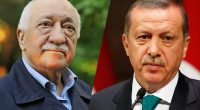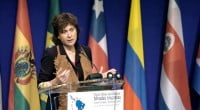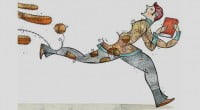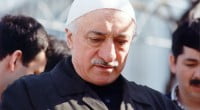Turkey Heads Toward Radical Islamic Dictatorship
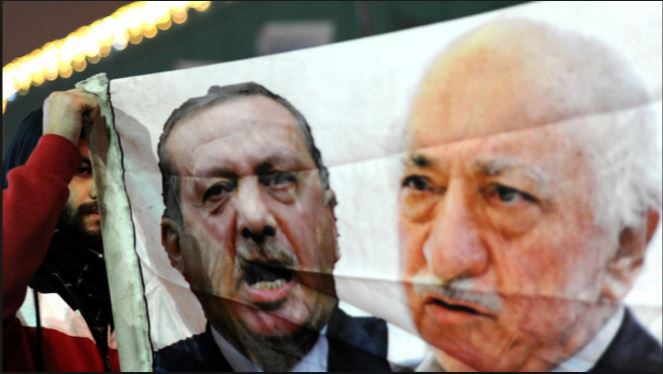
Date posted: August 11, 2016
VICTOR GAETAN
The coup attempt was so sloppy, the government’s counterpunch was so comprehensive, and Erdoğan so quickly consolidated authority by assuming near-dictatorial powers — power he has been steadily accumulating since his political party, Justice and Development (AKP), came to power in 2002 — that some analysts raised the possibility that the coup might have been a hoax.
Speaking to the Register on background, a U.S. government official who specializes in the region confirmed the insurrection was indeed an anti-Erdoğan operation, executed by a group of soldiers without wide support or high-level leadership within the military itself.
Rebels from the Turkish air force used F-16 jets to attack Parliament and government buildings. They relied on a refueling tanker from the Incirlik Air Base, where some 1,500-1,800 U.S. air personnel are located, on mission to strike Islamic State (IS) targets in Syria and Iraq.
More than 50 tactical nuclear weapons — NATO’s largest cache of hydrogen bombs — are alsolocated on the base.
U.S. troops and leadership were taken by surprise by the events. Power was cut to Incirlik as the Turkish government moved to crush the insurrection — although the United States maintains generators that kept essential operations powered. A week ago, the base was still surrounded by Turkish trucks, buses and civilians stirred up by imams.
Mobilizing the Imams
Erdoğan used social media to call his supporters into the street to defend him the night of the insurrection. Clashes resulted in some 300 deaths, mostly of civilians.
He also activated the Religious Affairs Department (Diyanet) to contact via text message the country’s Muslim imams, who are all employees of the Turkish government. Mobilizing through 85,000 mosques using a special prayer usually associated with funerals and war, Turkey’s 150,000 imams rallied people on behalf of the president across the country.
According to analyst Pinar Tremblau, writing in al-Monitor, a journal that analyzes Middle-Eastern developments, the Sala prayer was used during the Ottoman period to announce difficult battles in wartime.
Besides confronting the military rebels, largely concentrated in Istanbul and Ankara, supporters of AKP (the country’s largest political party) attacked several churches, both Catholic and Protestant.
Erdoğan has elevated the role of the Diyanet, not just domestically, but around the world. The Diyanet’s budget of $2.4 billion is larger than the combined budgets of the Ministries of Foreign Affairs, Energy, Tourism and Culture.
Power Grab
Over the last three weeks, the government has rounded up about one-third of all generals and admirals of the Turkish military, and more than 10,000 officers and soldiers are in detention.
As well, some 70,000 professionals, including teachers, professors, police officers, judges, lawyers, businessmen and journalists, have been fired or suspended from their jobs.
Thousands have been arrested. Civil rights are suspended. People are jailed with no way to consult lawyers or present a defense.
The coup has become an excuse for Erdoğan to purge state institutions, and even the private sector, of his critics, regardless of their guilt with regard to the insurrection.
The Turkish government — and a 100% state-controlled media — has accused the U.S. government of being behind the coup attempt itself and harboring its purported mastermind, Fetullah Gulen, 75, the Muslim scholar and founder of the Hizmet movement, who has lived in self-exile in Saylorsburg, Pa., since 1999. A mob surrounded his house last month, repeating Erdoğan’s accusations.
“Accusations are creating a tense relationship, and until Turkish authorities realize how counterproductive this rhetoric is, they will only poison the [bilateral] relationship,” an American official, who did not have clearance to speak on the record by name, told the Register.
Erdoğan “is creating a dangerous atmosphere,” he said, at a time when the region cries out for stability and wisdom.
While Turkey is demanding Gulen’s extradition from the United States, Secretary of State John Kerry says the country needs to produce evidence for the accusation, which Gulen denies.
A former ally of AKP when it came to power, Gulen has inspired Hizmet, a global movement dedicated to education and charitable work with a presence in 150 countries. Millions of Muslims are thought to be affiliated with Hizmet, which bases its work on an explicitly moderate interpretation of Islam.
The reclusive cleric condemned the coup attempt in an interview with CNN: “I have always been against coups, and I curse them. I would curse people who resort to coups against democracy, liberty, republic.”
Watching From Abroad
Emre Celik is president of the Washington-based Rumi Forum, which is dedicated to interfaith dialogue and intercultural understanding. The Rumi Forum was founded in 1999 by the Hizmet movement.
Celik discussed recent events in Turkey with the Register.
“The level of hatred and polarization in Turkey today is phenomenal. Erdoğan labels anyone who is critical of him a Gulenist,” explained Celik. “But Fetullah Gulen is just a scapegoat.”
He continued, “The Gulen movement is dedicated to selfless service to others, regardless of faith, age or worldview,” which attracts people around the world.
“At the core of the conflict in Turkey is a fundamental struggle between a grassroots service movement — an expression of civil Islam — and a politicized, top-down, autocratic version of Islam promoted by President Erdoğan,” said Celik.
“Erdoğan’s behavior since the coup represents the psychology of hate, creating unnecessary enemies,” Celik continued. “This doesn’t fit within the proper understanding of what it means to be a Muslim, it should go without saying.”
Celik pointed out how unreasonable the accusation of being a Gulen “sympathizer” is, especially considering Hizmet’s influence runs throughout Turkish society.
“Due process, which must function in a democracy, is gone,” noted Celik. “What is the crime? That a person read a newspaper [sympathetic to Gulen] or deposited money at a bank owned by Hizmet? Did his or her child go to a prep school?” asked Celik, with growing frustration.
Hizmet
What is Erdoğan’s nemesis, the Gulen movement, and what does it matter? The two sides represent divergent views on Islam.
In his lack of aspiration for power, Fetullah Gulen is far more like Aleksandr Solzhenitszn than Ayatollah Khomeini. Gulen interprets Islam as requiring community service, tolerance and access to education. By his school of thought, the central Islamic notion of jihad is primarily a moral struggle. Achievement in business and science is considered evidence of oneness with God. Engagement with Europe and interfaith communication are priorities, while violent conflict represents failure. In short, Gulen’s ideas reconcile Islam with liberal democracy, scientific rationalism and free enterprise.
Meanwhile, Erdoğan’s response to the coup attempt proves he is most comfortable brandishing the language of political Islam, ascendant in the Middle East.
Tragically, the enemy for Erdoğan is not Islamic State terrorism, but Gulen’s pluralism.
In the Turkish Islamic context, Gulen’s progenitor is a great Sufi scholar, Said Nursi (1878-1960), who emerged in the late Ottoman period and inspired an Islamic revival across the empire. Sufi Islam emphasizes the inner dimension of belief. Gulen was a follower of Nursi and aligns his theology with the Sufi tradition.
Nursi’s 6,000-page commentary on the Quran, Risale-i Nur (Epistles of Light) describes a spiritual way of life aimed at achieving perfection without requiring Muslims to study, sometimes for years, with a Sufi master — an attitude that serves to make the practice more accessible. He emphasized “non-physical” jihad (the struggle every believer experiences on behalf of God) and “positive action,” while avoiding force. Nursi considered materialism to be one of Islam’s main enemies, but endorsed the scientific method and advocated modern science instruction in Muslim schools.
Despite being associated with the inner salvation of Islam, in his lifetime, Nursi was a dedicated anti-communist who saw atheism and materialism as the twin enemies of the 20th century. He hoped to unify Muslims and Christians around the goal of resisting communism. With the origin of modern Turkey in 1923, under Kemal Ataturk’s rabidly anti-religion ideology, Nursi was consistently harassed, arrested and jailed.
Centrality of Education
Born in eastern Turkey to a Muslim cleric, Gulen grew up studying the Quran. He was licensed to preach in 1958 and subject to the strict controls on religion enforced by secular Turkey: All Sunni clerics were employed by the state, public authorities monitored religion, and expressions of Islamic sentiment in the public sphere could be considered criminal.
Gulen was jailed for more than six months in 1970, after a military coup rounded up some high-profile Muslim preachers. Building on Nursi’s concept of “practical action,” Gulen introduced the importance of serving one’s community as a sacred duty that helps believers to repress selfish impulses while glorifying God.
Gulen began setting up student hostels or “lighthouses” in the early 1970s and established the first private prep course for university entrance exams in 1974.
The first Gulen-inspired private high school followed in 1982. Ten years later, Gulenists trekked to Central Asia, intending to start a school in former Ottoman lands on the assumption that, with the collapse of the Soviet Union, young Muslims would need direction. In 2014, Gulen sympathizers ran more than 1,500 schools and universities in 120 countries, including Afghanistan, Austria, Bosnia, Indonesia, Japan, Mexico, Sudan, Tanzania and the U.S., including the biggest network of charter schools in Texas. Most Gulen schools emphasize math and science education.
For Gulen, education serves both a religious function and a vehicle for social reform. In religious terms, education leads one to knowledge of the Creator. It’s also a strategy for confronting the impoverishment of many Muslim societies.
In his post-coup rage, Erdoğan has targeted teachers, professors and deans because the Gulen movement is so strongly associated with education.
One thing essential for the Gulen agenda to function is social space. Private schools, private enterprise, democratic institutions and volunteerism all assume a social structure that is pluralistic and fundamentally tolerant of other ways of life. Again, Erdoğan is squashing Turkey’s pluralism in order to defeat Hizmet, but what the president is also killing is a successful, popular vision of a nonpolitical, nonviolent Islam.
Interfaith Dialogue
Going beyond tolerance is Gulen’s notion of dialogue, requiring respect for the “other.” One of the movement’s prime action items is interfaith dialogue, actively seeking engagement, especially with the so-called “people of the book,” Christians and Jews.
Nursi sent Pope Pius XII a copy of his works in 1950. As Gulen’s friend Msgr. Georges Marovitch, spokesman for the Turkish Catholic Bishops’ Conference, said, “Gulen made us love Islam!” The imam traveled to Rome to meet St. John Paul II in 1998 and has maintained contact with the Vatican in the intervening years.
Jesuit Father Thomas Michel, a Georgetown professor who specializes in Islamic theology, served in the Holy See to facilitate interreligious dialogue. He has explored points of comparison between Jesuit spirituality and Hizmet.
In an interview two years ago with the Register, Father Michel, who has been close to the Gulen movement since the 1980s, recounted how Gulen proposed to Pope John Paul II an interreligious university where the Abrahamic faiths could study together.
Tragically, interfaith dialogue in Turkey seems to have been eliminated by President Erdoğan, with his response to the attempted coup.
Senior Register correspondent Victor Gaetan is an award-winning international correspondent and a contributor to Foreign Affairs magazine.
Excerpt from National Catholic Register. Click below link to read full news.
Source: National Catholic Register , August 10, 2016
Tags: Democracy | Fethullah Gulen | Hizmet (Gulen) movement | Military coups in Turkey |

